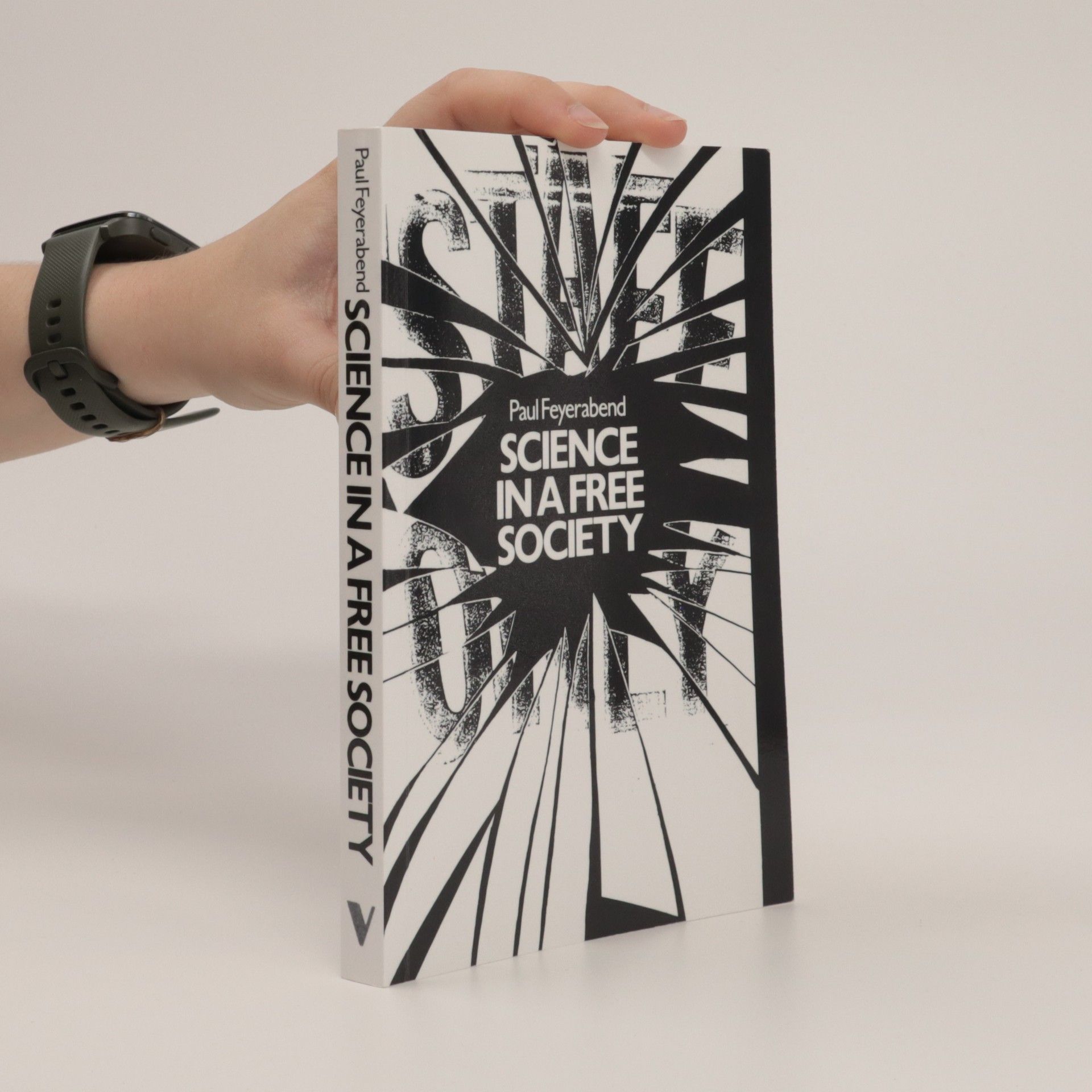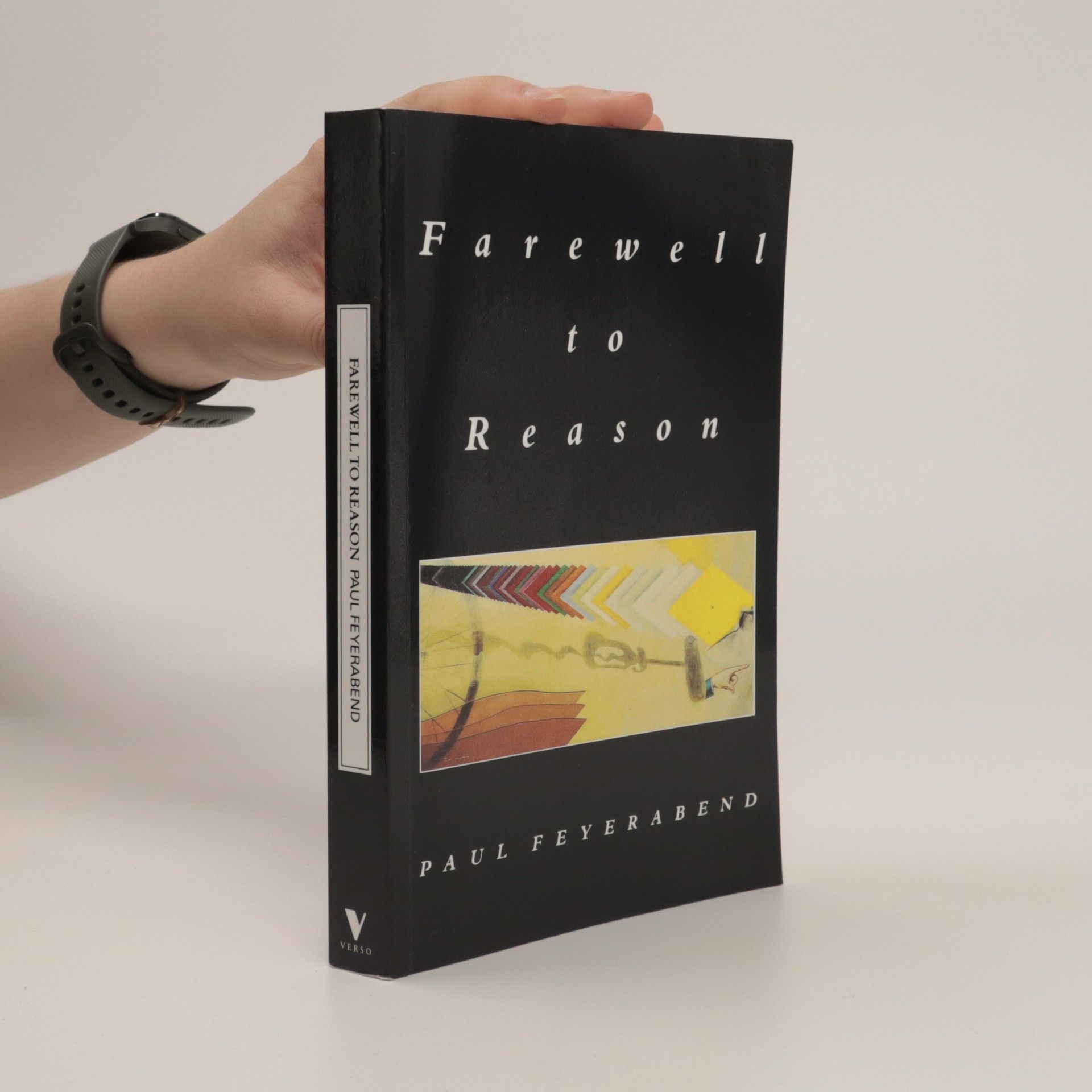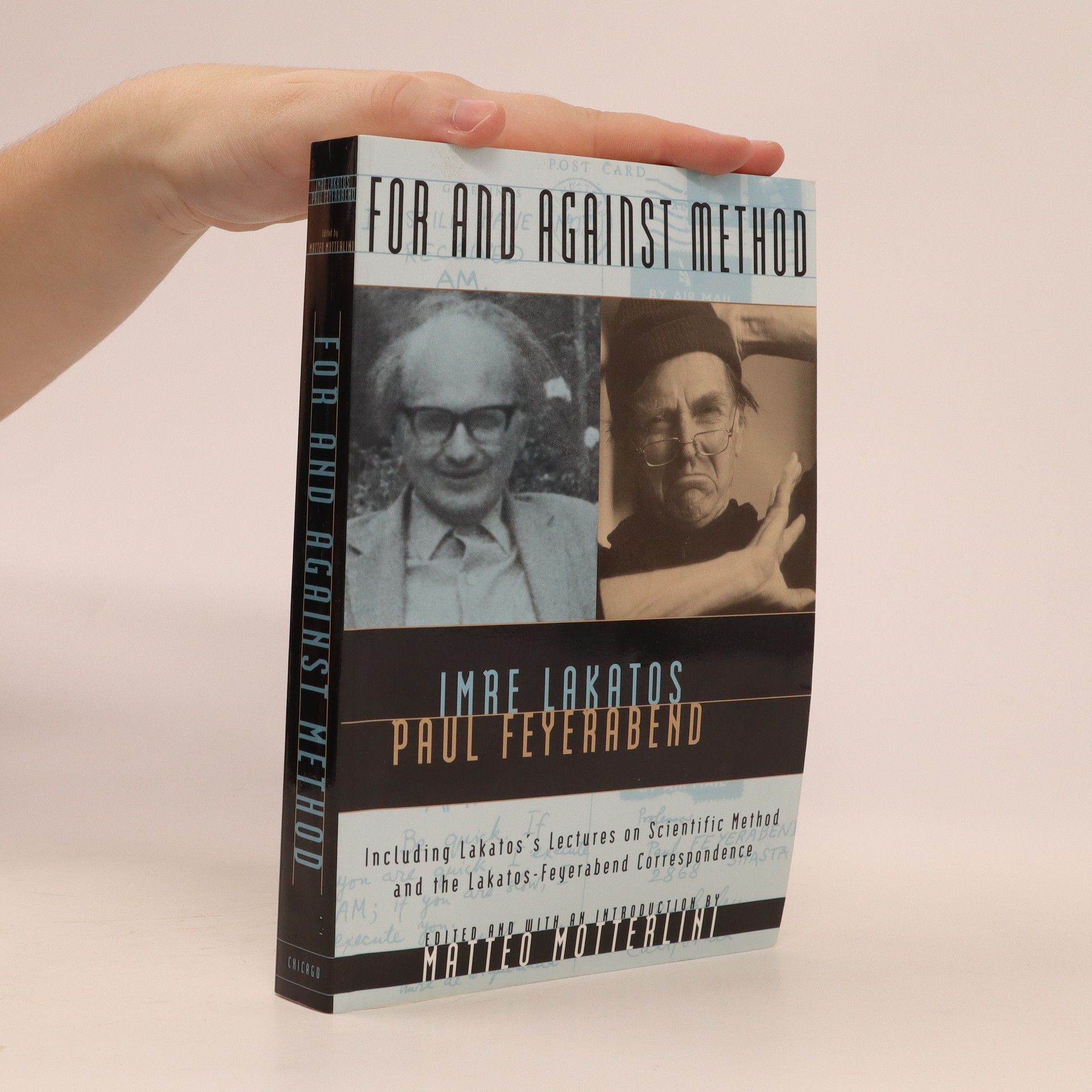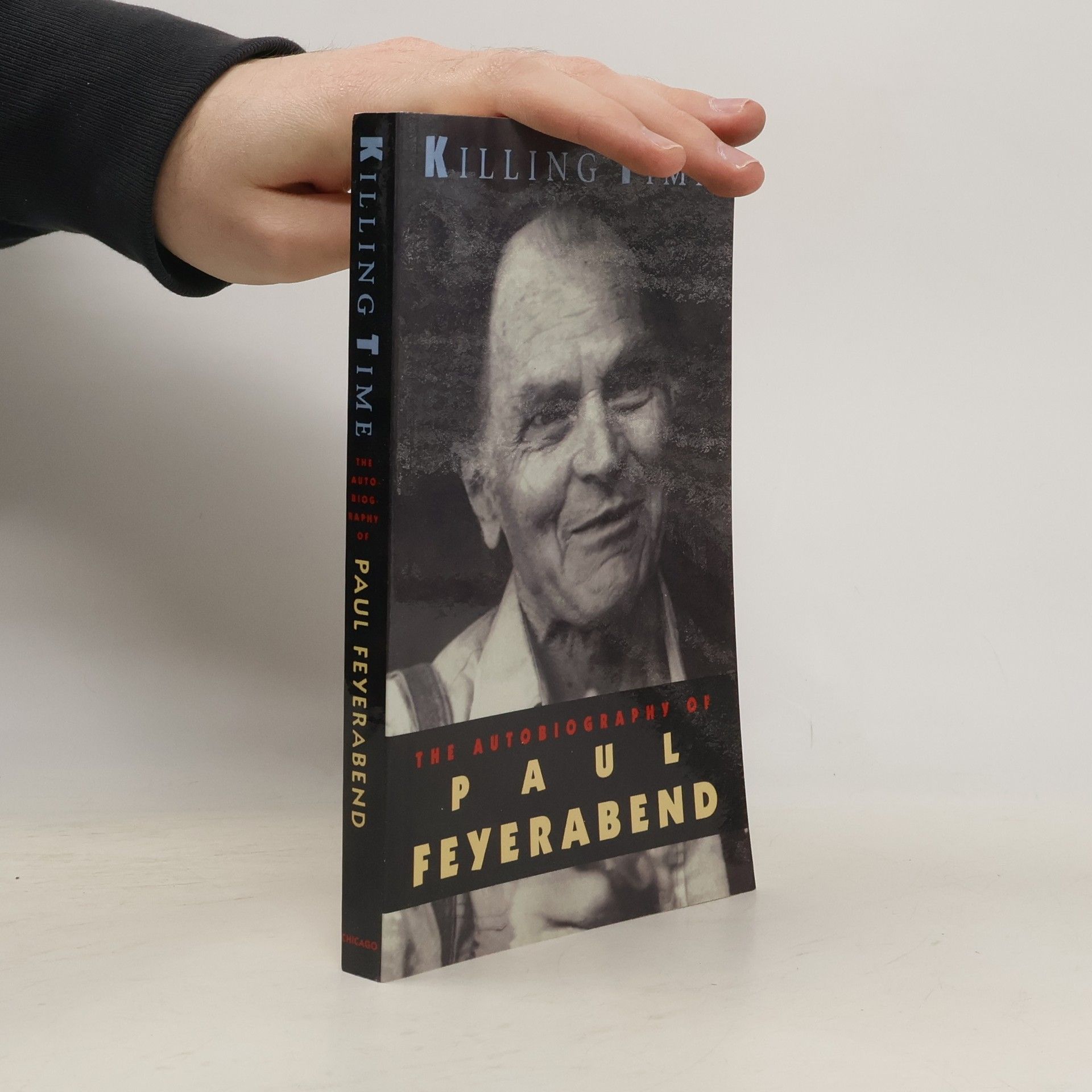Finished only weeks before his death in 1994, this autobiography traces the trajectory that led Feyerabend him from an isolated, lower-middle-class childhood in Vienna to the height of international academic success as one of this century's most influential intellectuals.
Paul Feyerabend Books
Paul Karl Feyerabend was an Austrian-born philosopher of science, known for his challenge to universal rules of scientific methodology. His work championed a free-spirited approach to science, rejecting a single, universal set of procedures. Feyerabend became famous for his purportedly anarchistic view of science, becoming an influential figure in the philosophy of science and the sociology of scientific knowledge. His ideas continue to provoke thought on the nature of scientific progress.







From flea bites to galaxies, Paul Feyerabend celebrated the sensory and intellectual richness of existence while acknowledging that human senses can only grasp a fraction of it. He posits that this limitation is a blessing, suggesting that a superconscious being would be overwhelmed rather than wise. This theme of managing experience is central to Feyerabend's work, which he was developing at the time of his death in 1994. The manuscript, compiled from his drafts, notes, and lectures, presents a captivating exploration filled with insights and the charm that characterizes his writing. Feyerabend examines how we strive to explain and predict the mysteries of the natural world, focusing on our tendency to abstract experiences and reduce wonder to formulas. He discusses the implications of these efforts, framing the "conquest of abundance" as a vital aspect of Western civilization's history and identity. Esteemed figures like Richard Rorty and Nancy Maull have praised Feyerabend's unique and adventurous approach to philosophy, highlighting his brilliant style and profound knowledge. This work serves as a testament to his thought, reflecting the richness of the world it seeks to understand.
For and Against Method
- 459 pages
- 17 hours of reading
The text opens with an imaginary dialogue between Lakatos and Feyerabend, which Matteo Motterlini has constructed, based on their published works, to synthesize their positions and arguments. Part one presents the transcripts of the last lectures on method that Lakatos delivered. Part two, Feyerabend's response, consists of a previously published essay on anarchism, which began the attack on Lakatos's position that Feyerabend later continued in "Against Method." The third and longest section consists of the correspondence Lakatos and Feyerabend exchanged on method and many other issues and ideas, as well as the events of their daily lives, between 1968 and Lakatos's death in 1974.
Farewell to Reason offers a vigorous challenge to the scientific rationalism that underlies Western ideals of “progress” and “development,” whose damaging social and ecological consequences are now widely recognized. For all their variety in theme and occasion, the essays in this book share a consistent philosophical purpose. Whether discussing Greek art and thought, vindicating the church’s battle with Galileo, exploring the development of quantum physics or exposing the dogmatism of Karl Popper, Feyerabend defends a relativist and historicist notion of the sciences. The appeal to reason, he insists, is empty, and must be replaced by a notion of science that subordinates it to the needs of citizens and communities. Provocative, polemical and rigorously argued, Farewell to Reason will infuriate Feyerabend’s critics and delight his many admirers.
Science in a Free Society
- 221 pages
- 8 hours of reading
No study in the philosophy of science created such controversy in the seventies as Paul Feyerabend’s Against Method. In this work, Feyerabend reviews that controversy, and extends his critique beyond the problem of scientific rules and methods, to the social function and direction of science today. In the first part of the book, he launches a sustained and irreverent attack on the prestige of science in the West. The lofty authority of the “expert” claimed by scientists is, he argues, incompatible with any genuine democracy, and often merely serves to conceal entrenched prejudices and divided opinions with the scientific community itself. Feyerabend insists that these can and should be subjected to the arbitration of the lay population, whose closes interests they constantly affect—as struggles over atomic energy programs so powerfully attest. Calling for far greater diversity in the content of education to facilitate democratic decisions over such issues, Feyerabend recounts the origin and development of his own ideas—successively engaged by Brecht, Ehrenhaft, Popper, Mill and Lakatos—in a spirited intellectual self-portrait. Science in a Free Society is a striking intervention into one of the most topical debates in contemporary culture and politics.
Against Method
- 296 pages
- 11 hours of reading
Paul Feyerabend’s globally acclaimed work, which sparked and continues to stimulate fierce debate, examines the deficiencies of many widespread ideas about scientific progress and the nature of knowledge. Feyerabend argues that scientific advances can only be understood in a historical context. He looks at the way the philosophy of science has consistently overemphasized practice over method, and considers the possibility that anarchism could replace rationalism in the theory of knowledge. This updated edition of the classic text includes a new introduction by Ian Hacking, one of the most important contemporary philosophers of science. Hacking reflects on both Feyerabend’s life and personality as well as the broader significance of the book for current discussions.
The Truth About the Truth
De-confusing and Re-constructing the Postmodern World
- 272 pages
- 10 hours of reading
Includes essays and excerpts from the works of prominent modern thinkers such as Umberto Eco, Jacques Derrida, and Isaiah Berlin among others.
Paul Feyerabend, a prominent 20th-century philosopher of science, presents a compelling narrative that explores the rise of rationalism in Ancient Greece, which led to the establishment of a mythical ‘scientific worldview.’ In this accessible work, he challenges prevalent myths about science, particularly the notion that it is inherently successful. Feyerabend argues that fundamental assumptions about science are often misguided, with many scientific ideologies stemming from superficial generalizations that distort our understanding of human life. He contends that scientific theorizing fails to address pressing issues like war and poverty, instead favoring fleeting generalities over the real particulars that imbue life with meaning. The emphasis on objectivity and generality, rooted in abstraction, comes at a significant cost, creating a disconnect between thought and experience. Theoreticians impose a tyranny on concepts, neglecting the subjective experiences that enrich life. Feyerabend posits that practical experience serves as a more reliable guide to reality than theory alone and asserts that all forms of tyranny, even those with noble intentions, can be resisted. Provocative and iconoclastic, this work represents one of Feyerabend’s final contributions and is essential reading for those interested in the impact of science on the modern world.
Probleme des Empirismus
Schriften zur Theorie der Erklärung, der Quantentheorie und der Wissenschaftsgeschichte Ausgewählte Schriften
Inhaltsverzeichnis: Einleitung zu den Grenzen eines kritischen Realismus. Der Pluralismus als methodologisches Prinzip. Wissenschaftlicher und philosophischer Realismus: Historischer Hintergrund, Arten des Realismus, Maxwell und Mach, das Zweisprachenmodell, Inkommensurabilität. Wissenschaftliche Praxis und philosophische Theorie: Degenerationsprozess der Wissenschaftstheorie, Commonsense und abstrakte Philosophie, historische und abstrakte Traditionen, Aristoteles, philosophische Maßstäbe, Ernst Mach und seine Nachfolger, Popper, Kuhn, Lakatos und das Ende des Rationalismus, politische Folgen. Erklärung, Reduktion und Empirismus: Annahmen des zeitgenössischen Empirismus, Kritik der Erklärung, methodologische Überlegungen, Sinninvarianz. Antwort an Kritiker: Pluralismus, starke Alternativen, Fortschrittsmodell, Konsistenz, historische und methodologische Fragen, Beobachtung. Der klassische Empirismus. Besprechung von Ernest Nagels „The Structure of Science“. Materialismus und das Leib-Seele-Problem. Verteidigung der klassischen Physik: Auffassungen von menschlicher Erkenntnis, Parmenideisches Vorgehen, Fortbestehen klassischer Ideen, klassische Statistik, Wahrscheinlichkeiten, Birkhoffs Satz. David Böhms Naturphilosophie. Quantentheorie der Messung: Probleme, von Neumanns Theorie, Stadien des Messprozesses, Schwierigkeiten. Dialektischer Materialismus und Quantentheorie. Zwei Theorien des Erkenntniswandels: Mill und Hegel. Wit
Der Ausspruch Wilfried Sellars‘, „Science is the measure of all things.“, der die Haltung vieler Wissenschaftler widerspiegelt, verbirgt nach Paul Feyerabend die autoritäre Ideologie eines wahren Wissens. Der Wissenschaftstheoretiker und Philosoph Feyerabend fordert dagegen die „demokratische Kritik der Wissenschaften“. Eine solche Kritik ist nach seiner Auffassung keine äußerliche Störung und Verunreinigung, sondern gehört wesentlich zur Genese von Wissen. Deshalb begibt er sich in seinen Trentiner Vorlesungen ebenso auf das Terrain des tagespolitischen Geschehens wie der Philosophie. Er untersucht nicht nur Schriften der Vorsokratiker, Sophisten, Platons und Galileis, sondern diskutiert auch Fragen der Kosmologie und Religion und kommt auf die griechische Tragödie sowie auf den Krieg in Ex-Jugoslawien zu sprechen. Einer der brillantesten Texte dieses Philosophen und sein letztes Werk, verführerisch durch den spontanen Stil der Vorlesungen, auf denen er basiert.



